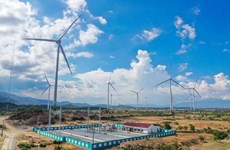FDI enterprises granted too many advantages: economist
Foreign direct investment (FDI) enterprises in Vietnam are afforded too
much preferential treatment, disadvantaging local businesses, economist
Pham Chi Lan has said.
Foreign direct investment (FDI) enterprises in Vietnam are afforded too
much preferential treatment, disadvantaging local businesses, economist
Pham Chi Lan has said.
The rapidly increasing FDI levels that followed Vietnam’s entry to the World Trade Organisation (WTO) -especially in exports- prove the country’s incentive policies are overgenerous, radio The Voice of Vietnam (VOV) quoted the economist as saying.
Lan said Vietnamese real estate prices continue to rise, limiting domestic businesses’ access to land. Conversely, almost all FDI enterprises can claim more land than really necessary.
Localities offer foreign investors land at artificially reasonable prices while Vietnamese businesses never receive similar treatment
FDI enterprises get long-term tax exemptions - as much as 10 years with no tax, and a further 10 years of 50 percent discount. They can easily borrow capital from Vietnamese banks. Vietnamese private enterprises often have to borrow loans at higher than listed interest rates.
Discriminating between FDI and local enterprises will lead to serious repercussions, Lan said. In the short term, weakening local businesses create space for FDI expansion and increased market share. Economic development should rely on internal rather than external strength, she noted.
FDI enterprises might push Vietnam’s GDP and exports higher but such figures are conditional on perpetually granting those businesses preferential treatment. A mass retreat of foreign investors, like Thailand’s 1997 experience, is always an unstated possibility and implied threat.
The State should limit the preferential conditions it offers foreign investors and level the playground with local competitors, Lan said.
Some FDI enterprises, even those investing in Vietnam for dozens of years, still manage to evade paying their due in tax.
Foreign businesses must first fulfill their obligations in Vietnam and abide by Vietnam's law while the State should extend its authority to supervise and control these businesses, she said.-VNA
The rapidly increasing FDI levels that followed Vietnam’s entry to the World Trade Organisation (WTO) -especially in exports- prove the country’s incentive policies are overgenerous, radio The Voice of Vietnam (VOV) quoted the economist as saying.
Lan said Vietnamese real estate prices continue to rise, limiting domestic businesses’ access to land. Conversely, almost all FDI enterprises can claim more land than really necessary.
Localities offer foreign investors land at artificially reasonable prices while Vietnamese businesses never receive similar treatment
FDI enterprises get long-term tax exemptions - as much as 10 years with no tax, and a further 10 years of 50 percent discount. They can easily borrow capital from Vietnamese banks. Vietnamese private enterprises often have to borrow loans at higher than listed interest rates.
Discriminating between FDI and local enterprises will lead to serious repercussions, Lan said. In the short term, weakening local businesses create space for FDI expansion and increased market share. Economic development should rely on internal rather than external strength, she noted.
FDI enterprises might push Vietnam’s GDP and exports higher but such figures are conditional on perpetually granting those businesses preferential treatment. A mass retreat of foreign investors, like Thailand’s 1997 experience, is always an unstated possibility and implied threat.
The State should limit the preferential conditions it offers foreign investors and level the playground with local competitors, Lan said.
Some FDI enterprises, even those investing in Vietnam for dozens of years, still manage to evade paying their due in tax.
Foreign businesses must first fulfill their obligations in Vietnam and abide by Vietnam's law while the State should extend its authority to supervise and control these businesses, she said.-VNA











